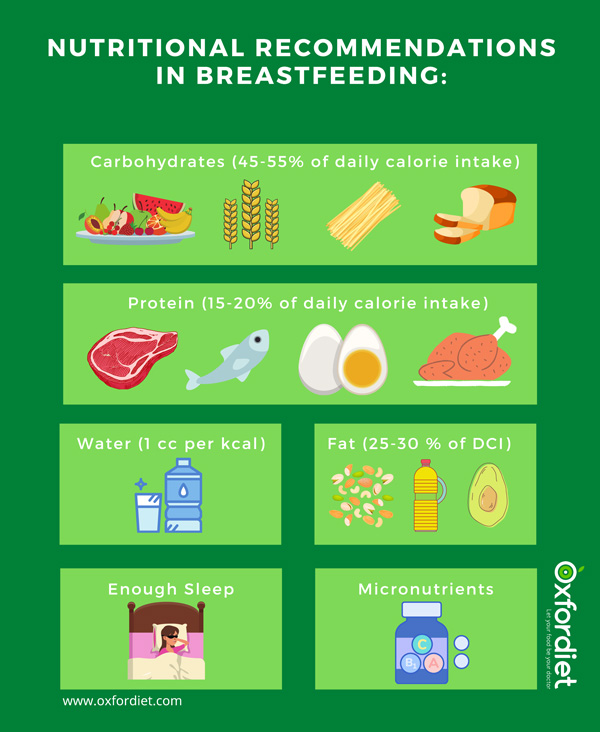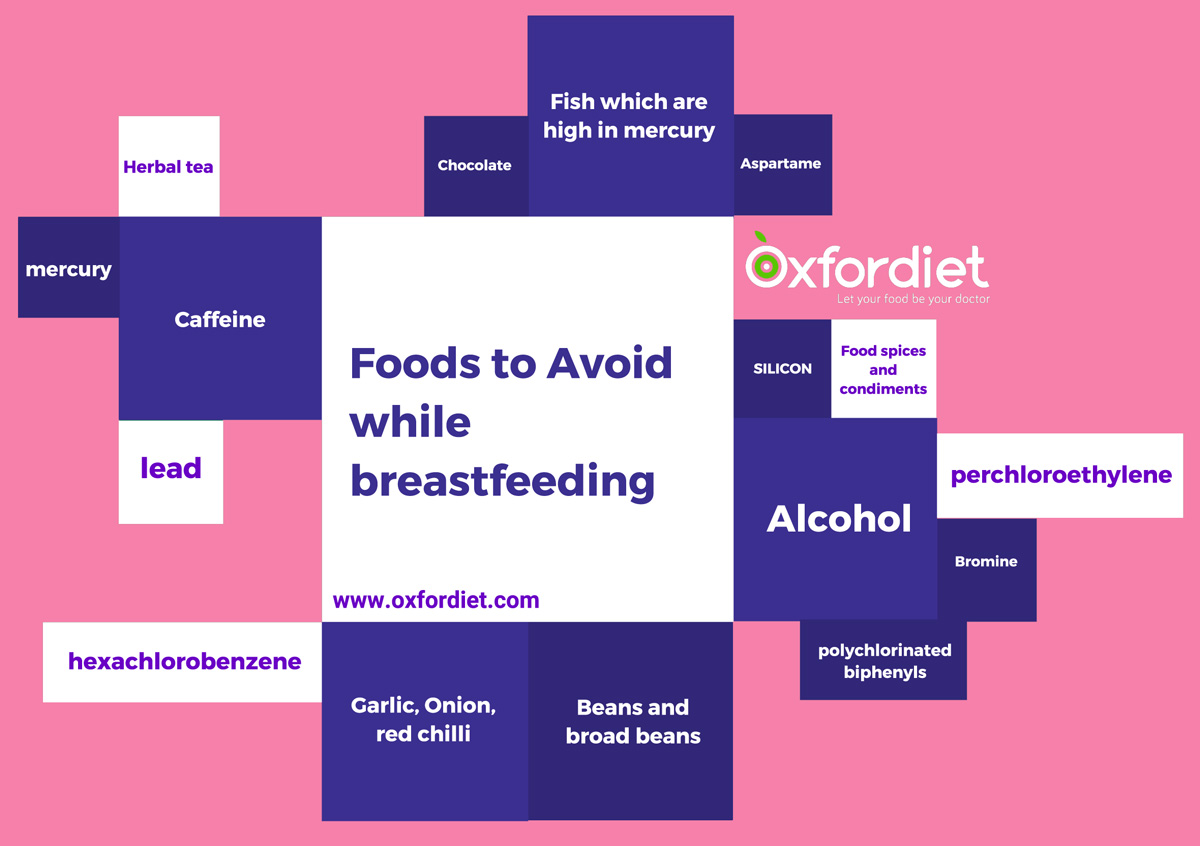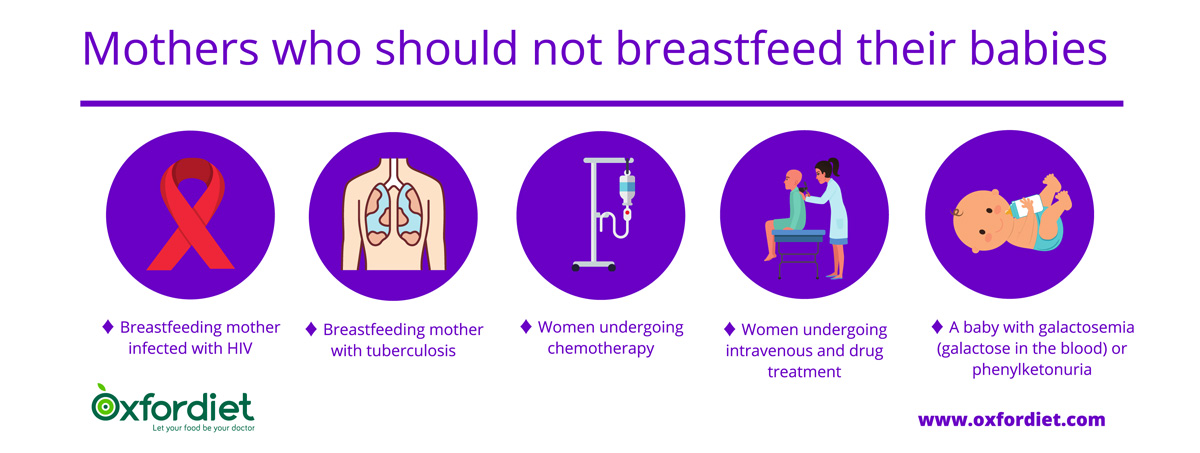Breast milk provides ideal nutrition for infants. Breast milk includes all vitamins, proteins, fats, and all infant needs and is more easily digested than formula. Breast milk contains vital substances like antibodies and anti-infective factors that essential for the baby's immune system, such as immunoglobulin (IgA), white blood cells, and whey protein (lysozyme and lactoferrin), and simple sugars.
In the following, we will explore how should be the breastfeeding diet?

The average milk production in the first sixth months is about 750 ml, and in the second six months is 600 ml.
In mothers who are on a low-calorie diet (under 1500 kcal per day), milk production may be insufficient.
The mothers' calorie requirements in the second six months are more than the first six months because the stored fats in the mother's body gradually decrease over time. Contraceptive pills can stop lactogenesis in the 6-10 weeks after postpartum.
The first sixth months of breastfeeding: daily energy requirement +330 Calories.
The second, sixth months of breastfeeding: daily energy requirement +400 Calories.
You should supply this amount of calories from your healthy breastfeeding diet.
Some women may experience difficulty with Lactation if they have inadequate milk production, low milk extraction, and insufficient caloric intake to meet demands in the postpartum period.
Current recommendations for lactating women are to have a minimum excess of 500 calories per day to meet milk production's caloric demands. Women are also encouraged to empty the breast as often as possible, typically every 2 to 3 hours, to maintain a milk supply.
Obese and overweight mothers may need less energy.
There is no significant connection between excessive intake in breastfeeding diet and the production of breast milk.
Fat stores accumulated during pregnancy are providing around 100-150 kcal of daily energy during the first months of breastfeeding.
Milk production in mothers on low-calorie diets (below 1500 kcal) and mothers with severe weight loss reduces.
Intense exercise that leads to lactic acid production is not allowed in breastfeeding mothers.
The nutritionist should help the mothers and train them about the days that may long to secrete the milk from the breasts, and it depends on how much the baby sucks the nipples.
A baby whose mother's breast milk is not enough may become dehydrated.
Birth control pills may stop milk production, especially in the first 6-10 weeks after delivery.
Stress, fatigue, and anxiety reduce oxytocin, and as a result, breastfeeding is disrupted, so nursing mothers should have enough sleep and be relaxed.
Breast milk contains the essential antibodies for a newborn baby to protect him/her from upcoming possible diseases. The long-term benefits of breastfeeding for mothers and children cannot be replicated with infant formula. When infant formula is not prepared correctly, risks arise from unsafe water and unsterilized equipment or the potential presence of bacteria in powdered formula. While frequent feeding maintains breast milk supply, if a formula is used but becomes unavailable, it is hard for a baby to switch in any milk. Breast milk can prepare the gut flora or gut microbiota, which is not available in the formula, and babies should use another specific supplementation.

8-12 glasses of water (1 cc per kcal)
Adequate rest, adequate sleep, no stress has effects on successful breastfeeding.
Protein intake in breastfeeding is like the second half of pregnancy and is generally about 71 g / day. 60 % of pro intake should be HBV (High Biological Value such as meat, poultry, fish, eggs white and yolks, dairy products) .
Adequate intake of Carbohydrates: in most case is about 210 g/day.
It is recommended that the intake of simple Carbohydrates does not exceed 5-10%.
The protein and cholesterol content of colostrum (a nutrient-rich fluid immediately after giving birth) is more than nature milk.
Fat: 25-30% of the total breastfeeding diet calories. The amount and type of fat in breast milk is affected by diet.
The combination of fatty acids in mothers' breast milk on a low-calorie diet is similar to their fatty acid store.
The amount and content of fatty acids of breast milk are directly under the effect of the mother's diet. Still, breast milk cholesterol is not affected by the cholesterol in the breastfeeding diet.
The infant on the breastfeeding diet gains 100 mg of cholesterol per day.

SFA or saturated fatty acids in animal fats such as meat or dairy products should be as restricted as possible. (under 10 %)
MUFA 15% of total calorie intake mostly in olive oil, canola oil, Flaxseed oil, walnut oil, soy oil.
PUFA 10% or less of total calorie intake like omega3 (1.3 g / day) and omega 6 (13 g / day) is needed and essential for developing an infant's retinal and nervous system.
During Lactation, the amount of iron and folic acid required for pregnancy decreases and the demand for zinc rises.
The amount of selenium, iodine, and some water-soluble vitamins in the nursing mothers' diet is reflected in their milk.
Vitamin D in milk is affected by the amount of vitamin D in the breastfeeding mother's diet and the amount of sun exposure the mother has.
The main minerals of breast milk is calcium. Recommendation of calcium for Nursing
mothers under 19 years old is 1300 mg/day, and for nursing
mothers above 19 years old is 1000 mg/day. There
is 3-7% bone loss of calcium during breastfeeding.
Phosphorus, Magnesium, Natrium, and Potassium, which are not affected by diet.
Due
to the unbalanced diet of nursing mothers, a multivitamin-mineral supplement is
recommended.
To meet the breastfeeding mother's needs, you should eat some more foods in the breastfeeding diet. Below is a list of these foods.
Foods are rich in calcium: dark leafy greens, Calcium-fortified juices, and breakfast cereals, dried beans. If you don't get to the Calcium target, you should go on supplementation, and you have to talk to your dietitian.
400 micrograms of folic acid: supplementation or rich foods such as spinach, meat or poultry, beans.
Foods high in vitamin D: Salmon, fortified foods and juices, yogurt.
High protein foods: egg, peanut butter, nuts, cooked beans, meats.
Iron: supplementation or foods like leafy greens, dark red meats, fish, fortified cereals.
Zinc: foods like meat, turkey, brazil nuts, fish, eggs. Despite using rich foods in zinc, studies have shown that breast milk zinc content is not affected by dietary or maternal zinc status.
The effects of food and environmental factors on breastfeeding are significant. You should care about what you eat in the breastfeeding diet; foods that you should avoid or eat with caution during the breastfeeding period is:
♦ Fish which are high in mercury such as King mackerel, marlin, orange roughy, shark, swordfish
♦ Aspartame and other artificial sweeteners
♦ Chocolate (containing theobromine) It may have laxative effects on babies
♦ Caffeine in coffee
♦ Alcohol

♦ Beans and broad beans
♦ Garlic, Onion, red chilli
♦ Herbal tea
♦ Food spices and condiments
♦ Gassy foods Cabbage, Brussels sprouts, broccoli, legumes
♦ Bromine, hexachlorobenzene, lead, mercury, polychlorinated biphenyls, silicon, perchloroethylene
There are a lot of foods that consuming by mothers that can cause some signs in babies like diarrhea, eczema, Congestion, and cramps, Including:
Dairy products, some fruits like lemon, kiwi, citrus fruits, strawberry pineapple, etc.
Cow's milk protein allergy has some symptoms that may occur immediately or subsequently, such as fever, itchy rash, vomiting, eczema. And it is different from lactose intolerance. If infants have allergies to cow milk proteins, they should remove all the cow's milk from their diet and their baby's diet.
Some breastfeeding mothers need more special attention than others; pregnant mothers who need special attention include the below:
♦ Age less than 17 years
♦ Economic deprivation
♦ Nutrient-restricted or unbalanced diet
♦ Smoker
♦ Adherence to a particular diet like veganism
♦ Weight less than 85% of ideal weight
♦ Multiple pregnancies or less than two years apart
♦ Inadequate weight gain during pregnancy
♦ Decrease Rapid weight during Lactation
♦ Getting pregnant while breastfeeding

Because the mother's condition affects the milk composition, the infant should not use breast milk in some cases. In other instances, the infant can not tolerate the composition of breast milk. In these cases, breast milk should not be used to feed infants. These cases include:
♦ Breastfeeding mother infected with HIV
♦ Breastfeeding mother with tuberculosis
♦ Women undergoing intravenous and drug treatment
♦ Women undergoing chemotherapy
♦ A baby with galactosemia (galactose in the blood) or phenylketonuria
Some medications can appear in breast milk, and have adverse effects on the infant, so if you are taking the following medications, feed your infant with formula.
♦ Acebutolol (ASA) lowers blood pressure and decreases heartbeat
♦ Salicylic acid makes diarrhea in infants
♦ Aspirin (salicylates) causes metabolic acidosis in infants
♦ Atenolol causes Cyanosis
♦ Bromocriptine may cause sudden interruption of prolactin secretion
♦ Clemastine causes Drowsiness, Irritability, Neck stiffness and baby restlessness and crying
♦ Ergotamine, which is used for migraines, can cause diarrhea and vomiting and seizures in the baby
♦ Phenobarbital causes drug dependence
♦ Primidone causes diarrhea and refusal of eating milk
♦ Sulfasalazine causes bloody diarrhea in infants
Most newborn infants may indicate jaundice, which means elevated bilirubin in their bodies.
If infants drink an adequate intake of breast milk, milk stops bilirubin's reabsorption in the intestines.
There are two types of jaundice:
One breastfeeding jaundice: in the first week of a newborn infant, the amount of milk is not enough.
Two breast milk jaundice: from the second weeks and later, some breast milk substances stop the process of bilirubin in the infant's liver. Formula and phototherapy can help.
Most infants who don't eat enough milk in the first three or four days are more likely to have physiologic jaundice. To prevent this, mothers should turn to formulas, and the waterier formula can excrete more bilirubin. If the infant becomes, dehydrated bilirubin can accumulate in the body and enter the baby's nervous system and damage.
Women with diabetes suffer from high stress during delivery, and milk production may be delayed. Lack of milk production is possible in the absence of symptoms of lactogenesis 72 hours after delivery. Stress increases the secretion of adrenaline that leads to Hyperglycemia.
So, carbohydrates division should be considered in diabetic nursing mothers by the nutritionist or dietitian.
For breastfeeding mothers who want to lose weight, 1 pound per week, or in other words, at least 1800 kcal per day is recommended.
When can nursing mothers start to lose weight?
After stabilizing the breastfeeding period, it means the condition of successful breastfeeding, e.g. after four weeks.
The losing weight diet should not be less than 1800 kcal because it induces some breast milk production or mother metabolism problems.
Dietitians may consider at least 1500 kcal for those obese or overweight mothers, but it should be directed effectively.
Another way of profitable weight loss and calorie restriction is by doing exercises. Still, the mothers should avoid exercises that lead to lactic acid production because it changes breast milk content. The infant may refuse to drink.
So, the mother should feed the baby before exercise and Do not breastfeed for 90 minutes after exercise.